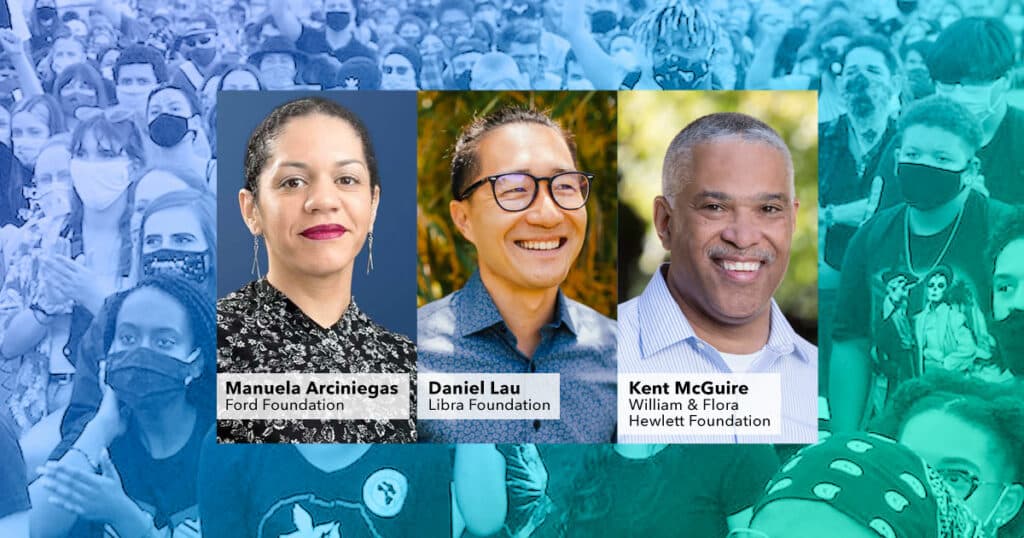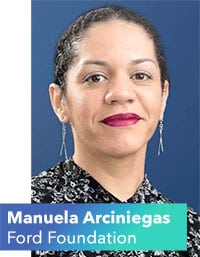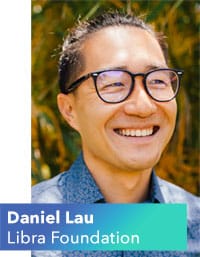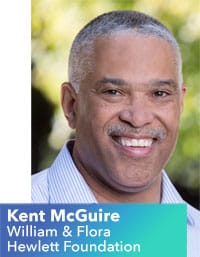How Can Justice Funders Measure Impact?

For funders who are new to supporting organizations working toward racial and gender justice, questions of impact and outcomes measurement are a frequent point of concern. How can we determine if our grants are used effectively? What kind of relationships do we need to build with grantees in this sector?
We spoke to three grantmakers who know these challenges and have built grantmaking practices that are helping the sector rethink outcomes and impact. Manuela Arciniegas is Program Officer, Civic Engagement and Government at the Ford Foundation. Daniel Lau is Initiative Officer at the Libra Foundation’s Democracy Frontlines Fund. Kent McGuire is the Program Director of Education at the William and Flora Hewlett Foundation.
How do you measure social impact in your grantmaking practice?
 Manuela Arcinegas: Because we prioritize following the lead of the communities directly impacted by injustice, we practice trust-based philanthropic approaches that create space for directly impacted people to analyze the root causes of systemic oppression and to determine for themselves the solutions they believe will transform their daily lives.
Manuela Arcinegas: Because we prioritize following the lead of the communities directly impacted by injustice, we practice trust-based philanthropic approaches that create space for directly impacted people to analyze the root causes of systemic oppression and to determine for themselves the solutions they believe will transform their daily lives.
Thus, communities define the transformation they want to see and exercise agency to chart the path towards achieving it. Our job as philanthropy is to accompany, resource robustly, leverage connections and relationships, and help leverage power from our perch to communities who were fundamental towards building our society through their labor, contributions and ideas, but continue to remain underinvested in or excluded.
As a foundation, we also have our own theory of change and through the strategy setting process, identify some key levers and outcomes we believe will increase our ability to support change in communities and reduce inequality.
Our approach in the Civic Engagement and Government team is to support the development of robust civil societies, support the development of reflective governance, and advance reforms to structural democracy. The Next Generation line of work I lead requires supporting the civic participation of diverse and often marginalized leaders while strengthening the capacity of organizations and coalitions fomenting the ecosystem of collaboration, data sharing, and alignment between and across systems that will advance greater change led by communities.
When we see communities setting agendas, actively engaged and driving systemic change efforts — increasing the accountability of government and elected leaders through strategies like community organizing, narrative change, and policy change — we know we are on the right track and supporting increased impact.
The specific indicators look different depending on region, place and issue. However, it is always philanthropy’s job to figure out how we measure the success of our grantmaking strategies against our own practices, while also learning from our partners what they believe are the ways the world is changing in response to their efforts.
 Daniel Lau: Libra Foundation and Democracy Frontlines Fund are guided by a trust-based approach to philanthropy that centers relationships, shares power and removes barriers. This model ultimately rejects the notion that we as funders can quantify impact because we know that those closest to the issues have the best solutions. Our strategic focus is funding BIPOC-led organizations and allowing them to determine what progress looks like.
Daniel Lau: Libra Foundation and Democracy Frontlines Fund are guided by a trust-based approach to philanthropy that centers relationships, shares power and removes barriers. This model ultimately rejects the notion that we as funders can quantify impact because we know that those closest to the issues have the best solutions. Our strategic focus is funding BIPOC-led organizations and allowing them to determine what progress looks like.
Although strides have been made in philanthropy in the last few years, we believe that all funders should be centering the visions of their grantees and allowing them to lead the way. Our grantees are frontline organizers building relationships with their community, organizing their constituents, and building local and sustainable political power to put pressure on systems and policies that move us toward a more equitable and just world for all of us.
Funding grassroots organizing is different than funding direct services and programming, which means we are less focused on measurable outcomes and more focused on racial, gender and environmental justice. We are reimagining traditional measures of impact to center the story of movements as defined by the organizers who are leading them. We ask our grantees open-ended questions like: What’s important for us to know about your work? How are you (and your staff) doing? What other organizations should we be funding in support of your work? Human-centered and community-focused questions lead to stories that assess where we are in the pursuit of a functioning multiracial democracy where all people, but particularly communities most impacted by injustice, are in the driver’s seat. Our job as funders is to move to get comfortable as a passenger and pay for the gas.
 Kent McGuire: These are active questions. Even if we thought we knew how to think about measuring impact, the last couple of years have caused us to step back and revisit these kinds of questions.
Kent McGuire: These are active questions. Even if we thought we knew how to think about measuring impact, the last couple of years have caused us to step back and revisit these kinds of questions.
As a sector, we often operate under the illusion that we can go off someplace and map out an elegant theory of change, then a strategy, enact that strategy, and then evaluate it — and if we actually changed something, we can call that impact.
But of course, the world conspires against us. We struggle with exogenous events that complicate everything.
And if anything has happened over the last 20 to 28 months, it’s been a set of external events that none of us could have predicted, that have thrown those elegant theories up in the air.
Consequently, we have to think harder about what constitutes progress and get better and better at making adjustments along the way. Question is: are we open to and smart enough to make these adjustments, given how complex the social issues are that we’re trying to get some leverage on?
We have a body of work that’s focused in five or six communities around the country and for these communities, we are trying to co-conceive of what constitutes progress.
And our grand agenda is to see real transformation in the name of equity and racial justice. Yet, we do not expect in a year or two to see a sweeping change in testing and assessment. We do not expect to see sweeping changes in curriculum, or in teacher knowledge and skill.
But at the outset, we hope to see a board resolution that commits to embracing equity and racial justice, and we do expect to see task forces created people organize to work on these things.
We are looking for the minutes from board meetings. We’re looking on people’s websites to see that they have declared intent. And we’re looking to see community input. So there are, I think, a set of markers of progress that we look for, that give us a sense of whether we’re headed in the right direction, and whether our grantees are on the same page with us.
How can funders determine outcomes for social impact measurement? How can we best incorporate grantee and grassroots voices in that process?
Arcinegas: Research and data is critical towards telling the stories and setting the change agenda. Impact data that illuminates inequality is essential towards the work but only so much as it helps the organizers and advocates advance their plan for systemic change and encourage governmental leaders to be more accountable.
We start, follow and end with those most directly impacted. Accountable relationships with community organizations accountable to a base are essential for change that is impactful, responsible, and the smartest and most effective answers. Networks and coalitions of community organizing groups, advocates, policy makers, narrative change makers, data analysts, are essential for effective systems change.
Lau: We have a brain trust advisory group that is all women of color, movement leaders who are currently situated within a funding intermediary themselves or have played a role in a funding intermediary. It’s the brilliance and the wisdom of our Executive Director, Crystal Hayling, who formed this brain trust and sets the vision and the tone for further engagement. We listen and rely on them because they are the folks who also have relationships to the organizers on the ground. They are our eyes and ears in the field. And they let us know what they are seeing and hearing when it relates to organizing and shifts among Black-led organizations. Thanks to their work we can ask: What are the pain points? What are the pinches and the challenges folks on the ground are facing? These questions and conversations drive how we’re thinking about outcomes.
McGuire: Among the things that we’re starting to reflect on from a liberatory design point of view is to think alongside our grantees at the outset. What are we trying to accomplish? What would a measure of progress or impact entail, so we’re on the same page going forward?
We also think that impact is something that’s not promised. There’s work for us to do, on the other side of having made the grant, to try to secure impact. We have an obligation to be in regular communication with our grantees, and lead in a spirit of trust.
For example, if as a funder you’re not just feeding folks, but trying to work on the system by which communities have healthier options and more access to wholesome meals, that’s a systemic problem where the measures of progress and impact would be different.
All you’d need in the first instance is to count the number of plates that were handed out. In the second, you have to know something about what contributes to healthy nutrition. What’s really important is the time the new funder spends up front getting clear about how they want to make a difference and talk that through with the folks that they may decide to support.
So I think we can measure all kinds of things if we put our minds to it. You can see whether more people on the ground are engaged in something, you can literally count that. You can look at the response rates to surveys. You can look at attendance at public meetings. You can gauge diversity. You can monitor what gets talked about. You can track whose voices were and were not heard. It simply becomes a data collection exercise.
And it’s through investing in collecting data and supporting grantees that you can come to know this complex work better and fully understand the progress you’re making.
For those looking to get started in racial justice funding, we have a guide, How to Get Started Funding Education Justice, that can hopefully serve as a good starting place. You can also reach out to Schott Senior Vice President of Advancement Lauren Hadi to start a conversation.

